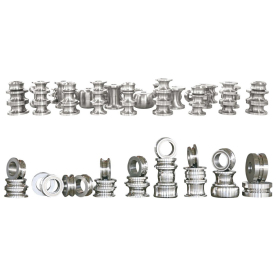[Roller for tube mill]Understanding the Importance of Roller Systems for Efficient Tube Mill Operations in Modern Manufacturing
News 2024-10-5
In the fast-paced world of manufacturing, the efficiency and reliability of production processes are paramount to maintaining competitiveness and meeting customer demands. One essential component that significantly contributes to the seamless operation of tube mills is the roller system. Tube mills, designed to produce tubular products from various materials, rely heavily on well-engineered roll sets to ensure precise shaping and optimal performance. This article explores the crucial role of roller systems in tube mill operations, their design considerations, and the benefits they offer.
The Role of Roller Systems in Tube Mills
Roller systems consist of various types of rollers, including forming rollers and finishing rollers, each designed to perform specific tasks during the tube manufacturing process. As steel, aluminum, or other materials are fed into a tube mill, the rollers apply pressure and manipulate the material's form. This results in precise dimensions and shapes of the finished tube product, which can be employed in various applications, from construction to automotive industries.
The primary function of the roller system is to facilitate the continuous forming of materials as they pass through the mill. The rollers adjust the material's shape gradually, ensuring uniformity and minimizing waste. An effective roller design can significantly increase the tube mill's throughput, enabling manufacturers to produce more products in less time.
Design Considerations for Roller Systems
The design of roller systems in tube mills is a complex task that involves various factors. Engineers must consider the material properties of the items being processed, the desired tube dimensions, and the overall operational requirements. The following are some key design elements:
1. **Material Selection**: The durability of the rollers is crucial for efficient operation. High-strength materials such as hardened steel or specialized alloys are often chosen for their resistance to wear and deformation. The ability to withstand high temperatures and pressures is also vital, especially in heavy-duty applications.
2. **Roller Geometry**: The shape and configuration of the rollers play a significant role in determining the product's final dimensions. Rollers can be designed with varying profiles, including round, square, or shaped rollers, depending on the required tube specifications. Careful calculations and simulations are necessary to achieve optimal results while ensuring the integrity of the material throughout the forming process.

Understanding the Importance of Roller Systems for Efficient Tube Mill Operations in Modern Manufacturing
4. **Cooling Mechanisms**: In some cases, metal components may need to be cooled during the rolling process. Integrating cooling systems into the roller design helps maintain the material's properties, ensuring it can be shaped without becoming brittle or deformed.
Benefits of High-Quality Roller Systems
Investing in high-quality roller systems for tube mills comes with numerous benefits:
1. **Increased Production Efficiency**: A well-designed roller system can significantly boost a tube mill's production capacity. With a reduced setup time and consistent product quality, manufacturers can meet market demands more efficiently.
2. **Improved Product Quality**: Consistent roller performance leads to more uniform tube dimensions and a better surface finish. High-quality tubes are not only easier to process downstream but also tend to have enhanced mechanical properties.

Understanding the Importance of Roller Systems for Efficient Tube Mill Operations in Modern Manufacturing

Understanding the Importance of Roller Systems for Efficient Tube Mill Operations in Modern Manufacturing
Conclusion
The roller system is a foundational element that drives the performance of tube mills. As manufacturers increasingly seek to optimize their production processes, understanding and investing in efficient roller systems can have a significant impact on output, quality, and overall operational costs. By ensuring that roller designs align with production goals, companies can enhance their competitiveness and position themselves for success in an ever-evolving market. In an industry where precision and efficiency are crucial, the role of roller systems in tube mills is more vital than ever.
